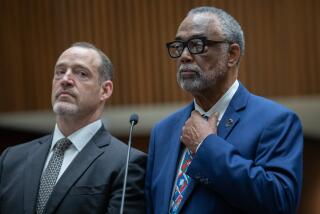Judge Clears Marshott of All Charges
- Share via
Former Stanton City Councilman Frank Marshott was acquitted Wednesday of criminal conflict-of-interest charges stemming from his votes to increase trash fees when he was serving as insurance broker for the city’s trash collection firm.
West Orange County Municipal Judge Marvin G. Weeks dismissed all three charges and excused the jury before Marshott had even launched his defense, saying he had come to “the unequivocal decision that Mr. Marshott was performing his duties in an impartial manner” and that there was “no evidence whatsoever” to indicate that the councilman stood to gain personally from the trash rate increases.
“I’m very happy; I’m relieved, and maybe I can go on with my normal life,” said Marshott, who lost his bid for an unprecedented fifth term on the City Council when charges were filed against him a week before the Nov. 6 election--and more than two years after the votes in question.
Marshott, who said he believes the charges were politically motivated, announced he is already considering another council campaign. “The people were more or less hoodwinked into thinking we have had a corrupt man serving on the council all these years,” he said of his defeat. “There will be no games this time. This has made a stronger man of me.”
Deputy Dist. Atty. Jim Reilly said he does not expect that the state will pursue civil penalties, since Marshott is no longer a member of the City Council, calling it “a dead case . . . . It’s finished.”
But he said he still believes Marshott had a conflict of interest under the definition in state law. “I don’t like to criticize judges, but I don’t think the judge understood either the general purposes of the Political Reform Act or the specific provision . . . that was the key issue in the case,” he said.
Residential Rates Doubled
The charges stemmed from Marshott’s votes in three council meetings during 1982 and 1983 when he approved trash rate increases at the request of Stanton Disposal Inc., which effectively nearly doubled rates for residential service. In two instances, Marshott seconded the motion, but all of the increases were approved as part of the council’s “consent calendar,” a block of agenda items considered to be routine that are acted on as a package.
Marshott has served as insurance broker for C R & R Inc., Stanton Disposal’s parent company, since the late 1960s. The prosecution argued that Marshott’s votes to increase rates presented a conflict of interest because of that relationship.
However, Dennis LaBarbera, Marshott’s attorney, said there was no evidence presented to show that the councilman--whose insurance brokerage handled all of C R & R’s insurance, not just the Stanton Disposal coverage--would have been substantially affected, even if the Stanton policy were canceled.
Complaints About Ruling
Reilly complained that the judge’s ruling sidestepped what both he and LaBarbera were arguing was a key issue in the case: whether Stanton Disposal Inc., and not necessarily Marshott, gained significantly from the vote.
“It was obvious that he didn’t have the foggiest idea what Dennis was saying, which is not to say that I agreed with Dennis. But at that point at least, the judge didn’t even understand what his position was, much less agree with it,” Reilly said.
The judge held that the intent of the state laws is to prohibit public officials from voting when they have a direct financial stake in the outcome. Marshott’s interest through the insurance policy “was so remote that it certainly is not the type of interest that would induce the bias of a city official to vote either favorably or unfavorably on an issue before the council,” Weeks said.
After his ruling, Weeks added as an aside: “I didn’t give a lot of consideration to the fact that it took the (district attorney’s office) two years to file the case.”
The original complaint against Marshott was filed with the county grand jury in March of 1984 by Councilman James Hayes, who unsuccessfully opposed Marshott for vice mayor a few weeks later.
Motivations Questioned
Reilly said there was a delay in filing the charges--until a week before Marshott’s unsuccessful reelection bid--because Marshott himself had asked for a delay in order to present additional evidence to district attorney’s office investigators.
After the ruling, Marshott said Hayes’ complaint was a result of “a personal vendetta” against him, partly because of Marshott’s plans to oppose him for the vice mayorship.
“He’s going to have to live with his conscience,” Marshott said.
More to Read
Sign up for Essential California
The most important California stories and recommendations in your inbox every morning.
You may occasionally receive promotional content from the Los Angeles Times.













